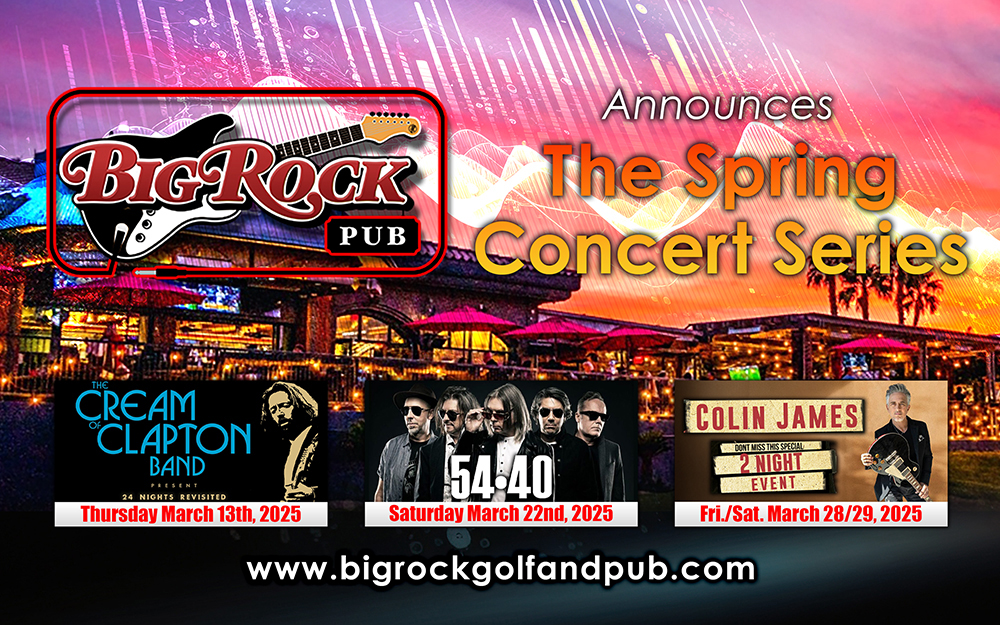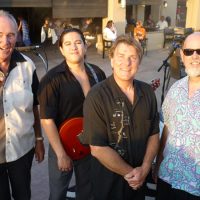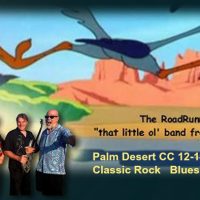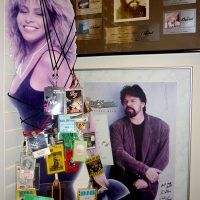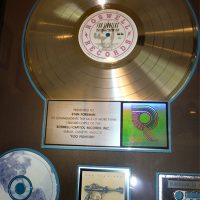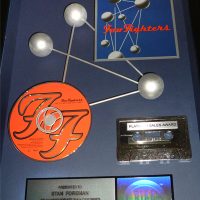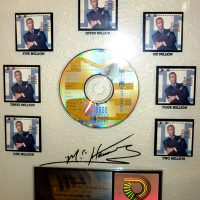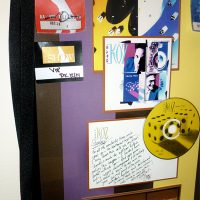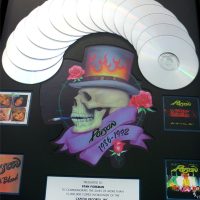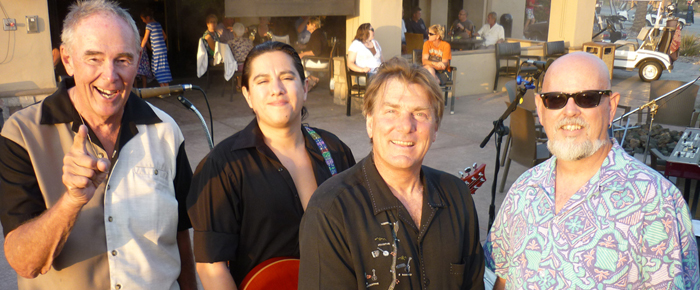
From Decades as Capitol Records A&R Man, Working with Artists Like Dave Grohl, Bob Seger, MC Hammer,Tina Turner, Garth Brooks, Poison and More, to a Country Club Near You
By Lisa Morgan
There are so many people living, working and playing in our desert, who underneath the surface, carry huge life stories and experiences that read like an award winning biography. Stan Foreman’s story is one of the most fascinating. After two decades during Capitol Records heyday, working as Promotion Manager for artists like Tina Turner, Bob Seger, Bonnie Raitt, Dave Koz, Garth Brooks, Poison (and that’s the short list), Foreman has more stories and memories to share than could ever fit in this article. The memories and mementos barely fit in his music room where the walls are lined with the platinum records he directly helped make happen. One might suggest that he write a tell-all of his life and times with Capitol Records finest, but as good a read as it would be, it probably wouldn’t sell in today’s market. There just wouldn’t be any dirt. If Foreman has any knowledge of dirty secrets or nasty experiences with any of his artists, you will never know it, talking to him. You won’t even think he’s withholding anything due to some sort of professionalism or loyalty. If anything, to hear him speak about those years, it begins to dispel the music industry’s corporate image of being a brutal task master and cut throat business. Instead, you begin to think of it as a place where the best and most deserving finally received the recognition they deserved, thanks to the help of a very supportive label and its Promotion Manager. My educated guess is that this man’s successes and reputation are a reflection of who Stan Foreman is at his very core: a positive and forward thinking visionary, intelligent and focused, with an incredible work ethic. And while his days with Capitol Records may dwell in the past, these character traits continue to make him successful to this day, even as a very busy local musician during his retirement here in the desert.
CVW: How did you begin your career at Capitol Records?
Foreman: I’d been in top 40 radio as a programmer and as an owner. I was also a radio DJ, a concert promoter, and owned a couple of retail establishments. I kind of got tired of doing the radio thing and wanted a career change. The record business always appealed to me, and having worked in radio, I knew a lot of the people in the business, so I thought I’d give it a shot. I applied for a few jobs and was passed over because they couldn’t see why I wanted to do it. Finally, I got a call from an independent distributorship. It was a foot in the door and it paid $150 bucks a week. Fortunately, at that time in my life, I could afford to do it. Three months later, I got a call from Capitol Records. They hired me and I stayed with them for the next 23 years. I was their North West Regional Promotion Manager. My job was to get Capitol Records artists on the major radio stations. At that time Capitol didn’t have their own country music department (country music wasn’t what it is today), so I worked with a lot of the country acts back then, acts like Sawyer Brown and Asleep at the Wheel. I also would go out on the road with our touring acts, and take them in to do the in-stores at Tower records and such, TV appearances… whatever it took to get them the exposure they needed. If they were new, we tried to get all the exposure they could. If they were a super act, someone like Bob Seger or Tina Turner, we would do a lot of meet and greets and after parties. Then we’d relay information to the sales department, so they could back up whatever air play we had with product in the stores.
CVW: Did you have a favorite artist to work with?
Foreman: We had a huge roster of stars, and almost all of them were really nice people, so it’s really hard to say who was my favorite. When I first met Bob Seger, he was the opening act for Blue Oyster Cult. We worked together for 20 years between 1976 and 1996. He’s a real nice guy.
I had a special bond with Tina Turner. I had seen her show back in ’84, when Capitol had just signed her and before her album, Tiny Dancer, that had “What’s Love Got to Do With It” came out (this was also just after her split from Ike). She was doing a show at a little club. Afterward, I went back and introduced myself to her, and told her I was really glad we signed her and looked forward to her record. The album came out a year later and was an instant smash. I reunited with her for her tour of that album. She was opening for Lionel Richie. She told me, “I never forgot that you came to see me when I was nobody.” So we had a bond right from the beginning. She’s just a really terrific person.
Anne Murray… At first, when I found out that I’d be working with her, I thought, ‘This is going to be boring.’ I talked to another promo guy about how she was to work with. He said, ‘Anne Murray knows the meaning of the word mother fucker, and is not afraid to use it. You guys will get along great.’ She was just so cool, and one of the greatest voices out there. Every night her show was unbelievably good. Some people might think that Anne Murray is not hip. To me, she’s one of the hippest artists out there.
Some of my favorites were people who weren’t quite as commercially known, like Dave Koz, or Bonnie Raitt – the coolest people I’ve ever met – even Garth Brooks. By the time Garth came along, the label knew he’d be a cross-over act (appeal to both country and pop listeners). The first show I saw him at, was in Seattle at a little 200 person venue. You could easily see that he was going to be around for a long time. It’s kind of funny story with Garth; I had a lot of things to do at that point, and might not have seen him, if my assistant hadn’t pulled me aside and said, ‘You really have to see this guy!’ When I did, I knew it was just a matter of time. (As an A&R guy for the label, Foreman really had to make the call as to who he put most of his energy and reputation behind). I remember we had set up a show for Garth to play with his band for all the top 40 and hot AC folks in radio, as well as R & R Magazine, one of the biggest trade magazines in the industry. It was going to be a very important showcase for him. Just before the show, Garth’s drummer’s wife had her baby early. Garth came to us and said that, even though this was probably the biggest show of his career, he just couldn’t ask his drummer to come play it (and obviously replacing him wasn’t an option). He said he’d come by himself, with just his guitar and entertain them. We all thought to ourselves, ‘Oh great, how’s this going to work?’ Within 15 minutes, he had the entire room in the palm of his hands.
I worked with Poison. They really didn’t get a whole lot of respect other than from the fans who bought their albums. They have 23 platinum records, and I have them in a display they gave me, hanging on my wall in my music room.
I also worked with the Foo Fighters, when Dave Grohl first started that band. I remember driving him around, visiting radio stations. I thought, right from the beginning, that this guy really gets it. This guy was so smart.
Capitol had everybody from Paul McCartney to Butthole Surfers on their label. There was Natalie Cole, Glen Campbell, Little River Band, America, Doobie Brothers – there’s so many greats, I can’t even remember. There was an incredible amount of talent on the label at that time. Record labels based their decisions to sign people that they felt would be around for several years. You couldn’t make a lot of money on a one shot artist in those days. It wasn’t good for the label, and it wasn’t good for the artist. I go in my music room now and see all the gold and platinum records, and I just smile for all the great things that happened, and how much fun we had.
CVW: What do you feel was the main difference you and the label would see in the artists that would be a star for a moment and the artists that would be timeless?
Foreman: Every once in a while there would be an act, 18-20 years old, that would put their first record out and it’d be a wild success. But what I’ve noticed is that most of the acts that ultimately earned long-term success and label attention, had worked hard. They toured, they had been out there for a while working and paying their dues – working and working. Then finally, as a result, they hit with the right songs, the right producer, the right label. Heart, is a great example. They started out on Mushroom Records, a little label out of Vancouver BC with their album, Dreamboat Annie. CBS picked them up and had them on Epic. Then, after some success, they went a little dry. We signed them in 1984 and put them with one of our great producers, Ron Nevison, and they brought out their self-titled album with the song, “These Dreams” sung by Nancy Wilson. They had a ten year run with Capitol. If the talent is there, and you just stick with it, you’re probably going to make it.
CVW: How did you come into becoming a performer yourself, here in the desert?
Foreman: I had been playing keys since the ’60s. I quit for a while when I worked with Capitol. After I retired and moved to the desert full time in 2006, I would play golf with friends. They’d have parties, and I’d always end up sitting at the piano and playing. They’d dance and have a great time, so I figured there was a market for it. I put together about 3 sets worth of songs. The first country club I went into, I played a couple of songs for the manager, and he hired me on the spot. I called it, ‘Stan the Man and the Old Time Rock and Roll Dance Party’. I planned on sticking to country clubs and private parties. I tried meeting as many people in the music scene here as I could. I was Brad Mercer’s key board player for a while. I met other great local musicians like Michael James and Barry Baughn. I was approached by Dan Spriegle of Just Java Coffee and co-hosted an open mic for them. Folks from PGA West came in, and we started talking about a music program for them. We ended up putting a band together and called it the Road Runners. We’ve had a couple of changes since that original lineup, but now we’re pretty busy playing music that is very tuned in to the older demographic here in the desert. I’m very selective where we play, because I know who we are and where we fit.
You can meet Stan Foreman and his extremely talented band, of rocking, bluesy Road Runners (Alex A on guitar, John Weir on drums, and Tim High on bass) this Friday night at Palm Desert Country Club between 6:30 and 9:30pm. They are booked once a month on the Palm Desert Country Club patio, which is famous for its beautiful waterfall back drop against the greens, and its warming fire pits. It will be the perfect setting to dance along to your classic favorites provided by a band that rarely plays public venues due to their popularity and very busy schedule of private bookings.
You can follow Stan “The Man” Foreman and the Road Runners on Facebook at www.facebook.com/RoadrunnersRock (or just type in RoadRunners La Quinta)
You can also get a taste of their music from their promotional video on YouTube at http://youtu.be/bOcq2K77jPc



